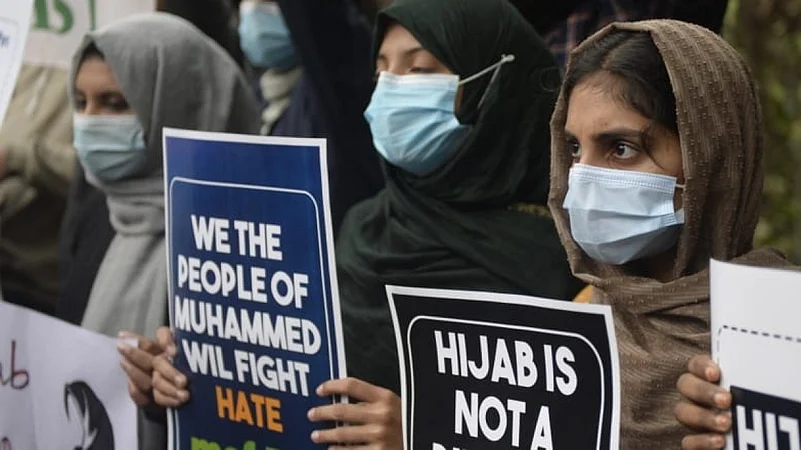Without giving any conclusive verdict on the Hijab case, the Supreme Court today referred the matter to a larger bench for fresh hearing and examination. The two-member bench of the top court comprising Justice Hemant Gupta and Justice Sudhangshu Dhulia couldn’t reach a concensus and said that there is a ‘divergence of opinion’.
In a split verdict, Justice Gupta while wanted to dismiss the petitions challenging the earlier verdict of the Karnataka High Court upholding the ban on Hijab in the school and college premises of Karnataka, Justice Dhulia was of different opinion. He wanted to pursue the case further on the ground that it is a matter of choice and the education of the girl students cannot be compromised.
Advertisement
Ruling out the very examination of the essential religious practices on which the judgment of Karnataka HC stands, Justice Dhulia said, "The main thrust of my judgment is that this entire concept of essential religious practices, in my opinion, was not essential for disposal of the dispute."
Stressing on the needs of women education and drawing from the submission that the Hijab ban may puportedly affect the educational prospects of the Muslim girls, he asked, "Are we making her life any better?"
While allowing the appeals against the high court verdict, Justice Dhulia said he has quashed the state government's February 5, 2022 order banning clothes that disturb equality, integrity, and public order in schools and colleges.
Advertisement
The matter will now be referred to the Chief Justice of India (CJI) who will form a larger bench for hearing the case further. The top court earlier reserved its verdict on September 22 after a marathon hearing from several petitioners.
Also Read | Many Wars On Hijab: Is The Veil So Veiled?
The Concerns over Girls’ Education
Justice Dhulia’s concern over the education of the girl students echoes the submission of the advocate Huzefa Ahmedi who told the court on Septemeber 14 that “it is very possible that in a conservative family system, the parents may then say that please then don’t go to school, go to a madrasa. That will be the fallout. And this is the elephant in the room which can’t be ignored.”
On being asked whether she could produce authentic data to her claims, Ahmedi cited the recent PUCL reports that contains testimony of several students and said that since the HC judgment around 17000 students have abstained from appearing in examination.
Karnataka HC verdict and the Challenge in the SC
Several pre-University Muslim girl students had filed petitions before the SC challenging the verdict of the Karnataka High Court that on March 15 dismissed their plea saying that the Hijab was not an essential practice in Islam.
Advertisement
The HC also said that the implementation of Article 25 that is of right to practice religion comes with the ‘reasonable restrictions’ and the Karnataka Government was within its constitutional bounds to prohibit the hijab in the school premises as the prescription of uniform restricts any divergence.
The girl students then moved to the SC on the ground of freedom of expression and said in their petition that the ‘right to wear hijab comes under the ambit of ‘expression’ and is thus protected under Article 19(1)(a) of the Constitution’.
Advertisement
The Karnataka Government Order Banning Hijab
The Karnataka Government in its order on February 5 banned wearing Hijab in the schools and colleges saying it disturbs equality, integrity, and public order in these institutions.
In its recent submissions to the SC, the Karnataka Government also said that the whole controversy is a part of larger conspiracy and prior to 2022 this sort of issue never came up.
Obliquely signalling the participation of the now-banned Popular Front of India (PFI), the state government said that it was through social media campaigns and other means the Muslim girl students had been encouraged to wear the Hijab and when the college authority of the Pre-University Government school of Uddupi took the decision to not allow it, the situation went out of hands.




















